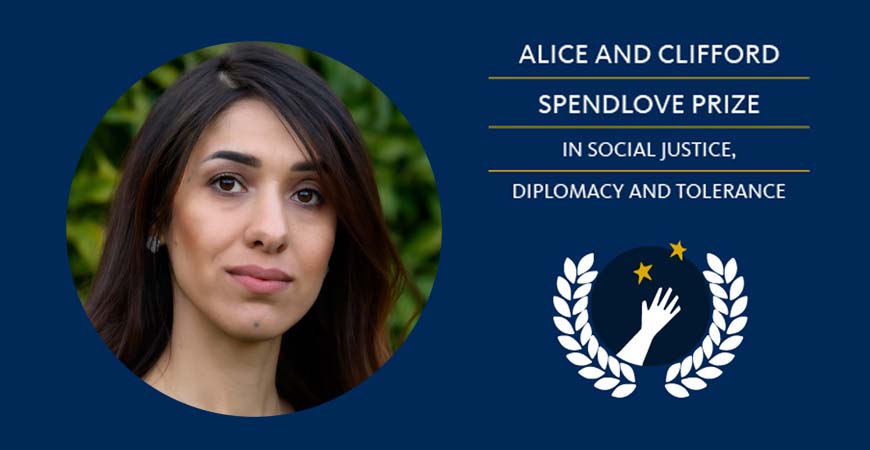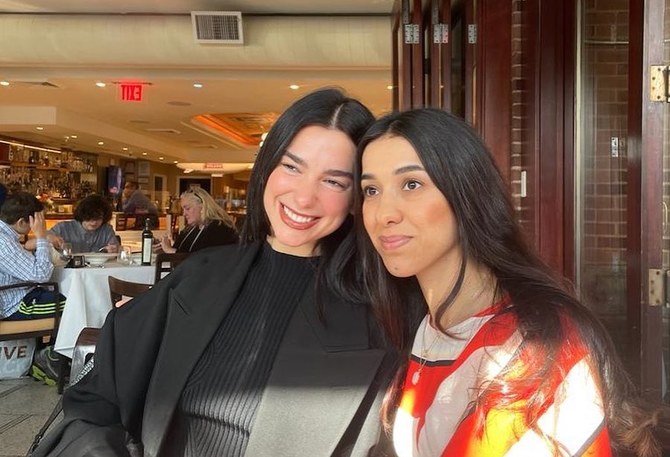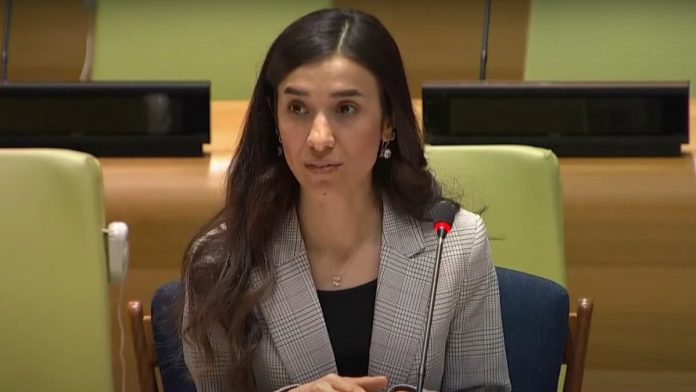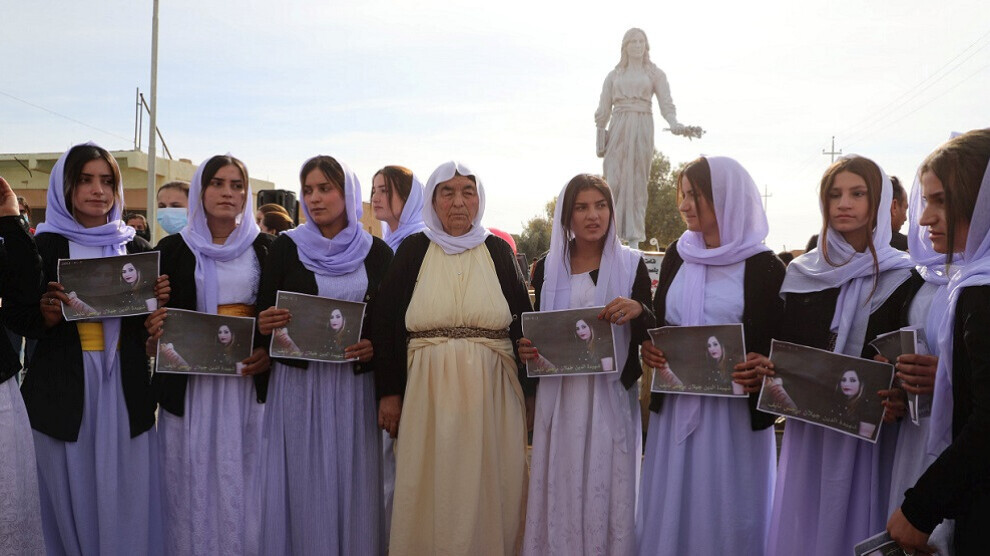
Nadia Murad Receives Spendlove Prize
2018 Nobel Peace Prize winner and human rights activist Nadia Murad was honored with the Alice and Clifford Spendlove Prize in Social Justice, Diplomacy and Tolerance during a virtual ceremony on Wednesday. She is the 14th recipient to receive the award since it was first presented at UC Merced's grand opening Sept. 5, 2005
"Growing up in a rural town in Iraq, I never could have imagined award ceremonies like this," Murad said. "But the values of social justice and tolerance that this award recognizes have always been at the center of my life."
Murad, an advocate for survivors of genocide and sexual violence, recounted the difficulties she and her family endured in Iraq. She explained that her family was poor, but her mother worked hard on her own to provide for Murad and her siblings.
Because her older brothers and sisters worked on the family farm, Murad was able to receive an education. She said she will never forget what they sacrificed for her.
"I was determined to succeed not only in class but also in paying the opportunity forward," she stated. "My family's examples encouraged me to help others in any way I could."Nadia Murad is seen during the Spendlove Prize virtual ceremony on Nov. 3, 2021.
Spendlove Prize recipient Nadia Murad dedicated the award to her family.
In 2014, her village of Kocho and many others in the region of Sinjar came under attack by the Islamic State. ISIS militants undertook a campaign to ethnically cleanse the Yazidi ethno-religious minority in Iraq from existence because of their faith. In her New York Times bestselling memoir "The Last Girl: My Story of Captivity, and My Fight Against the Islamic State," Murad provides a harrowing account of the genocide against the Yazidis and her imprisonment by ISIS.
Approximately 400,000 Yazidis fled to the neighboring Kurdistan Region, and tens of thousands took refuge on the top of Mount Sinjar, Murad said. They faced starvation and extreme temperatures that claimed many lives.
"The rest of us, unable to flee, were killed or taken captive," Murad said. "More than 6,000 women and children were taken captive by ISIS, and over 2,800 are still missing today, including my nephew, niece and sister-in-law."
Murad always knew she wanted to help people. At a young age, she was passionate about hair and makeup. She dreamed of opening her own salon that would be accessible to women in her community — given that the nearest one was in a city hours away.
"I wanted to use these skills to empower women around me," Murad said. "Hair and makeup were not simply about beauty; it was an excuse to take a break and connect with other women."
A decade later, she admits, her plans have changed. But the goals remain the same. She has been speaking out on behalf of her community ever since escaping captivity.
"I still want to empower Yazidi women and am working to make important services accessible in my homeland," Murad said. "That's why I founded Nadia's Initiative after the Yazidi genocide."
Nadia's Initiative is a nonprofit organization dedicated to rebuilding communities in crisis and advocating for survivors of sexual violence. Its current work is focused on the sustainable redevelopment of the Yazidi homeland in Sinjar and pursuing holistic justice for survivors of ISIS atrocities.
Murad and her team have advocated for legislation that protects and promotes women's rights, as well as drafted and advocated for the passage of resolutions to expand the United Nations' commitments to end sexual violence in conflict. In 2016, she became the first UN Goodwill Ambassador for the Dignity of Survivors of Human Trafficking. Two years later, Murad won the Nobel Peace Prize with Dr. Denis Mukwege and was appointed as a UN Sustainable Development Goals Advocate in 2019.
During Wednesday's virtual ceremony, UC Merced Executive Vice Chancellor and Provost Gregg Camfield recognized Murad for bringing about change and formally presented her with the 2021 Spendlove Prize.
The Spendlove Prize is made possible by a generous gift from Merced native Sherrie Spendlove, established in honor of her parents, Alice and Clifford. At the conclusion of the ceremony, Spendlove commended Murad for her work and welcomed her as the newest honoree.
"Nadia, the Spendlove Prize and UC Merced are truly honored to have you join our Spendlove Prize family," Spendlove said. "Your soulful work is important to us all. Your call for international justice for universal accountability for the atrocities that have been committed; Nadia's Initiative to the Murad Code; all those things to facilitate dealing with these terrible traumas are so insightful."
"We are delighted to have Nadia Murad join the growing number of recipients of the Spendlove Prize," School of Social Sciences, Humanities and Arts Dean Jeffrey Gilger said. "Alice and Clifford Spendlove focused their careers on improving the lives of others — something that Nadia is working tirelessly to accomplish as well."
The Spendlove Prize recognizes a renowned scholar, author, artist or citizen who exemplifies, in their work, the delivery of social justice, diplomacy and tolerance in the diverse local and global society. The recipient serves as a role model and inspiration for students, faculty, staff and the community surrounding UC Merced.
Past recipients of the prize include Black Lives Matter co-founder Alicia Garza, former President Jimmy Carter, 1992 Nobel Peace Prize winner Rigoberta Menchú Tum, attorney and Professor Anita F. Hill, among several other high-profile figures.
The Spendlove Prize Selection Committee is chaired by the dean of the School of Social Sciences, Humanities and Arts and includes a representative from the Spendlove family or a designee, an undergraduate student, graduate student and representatives from the UC Merced community. This year, the award committee is chaired by Gilger and includes Sherrie Spendlove as family representative, Department of Literatures, Languages and Cultures Professor Nigel Hatton as a member of the faculty — who also served as host of the ceremony — and Lee Anderson and Charlie Bennet as community members.
https://news.ucmerced.edu/news/2021/nob ... -spendlove


























